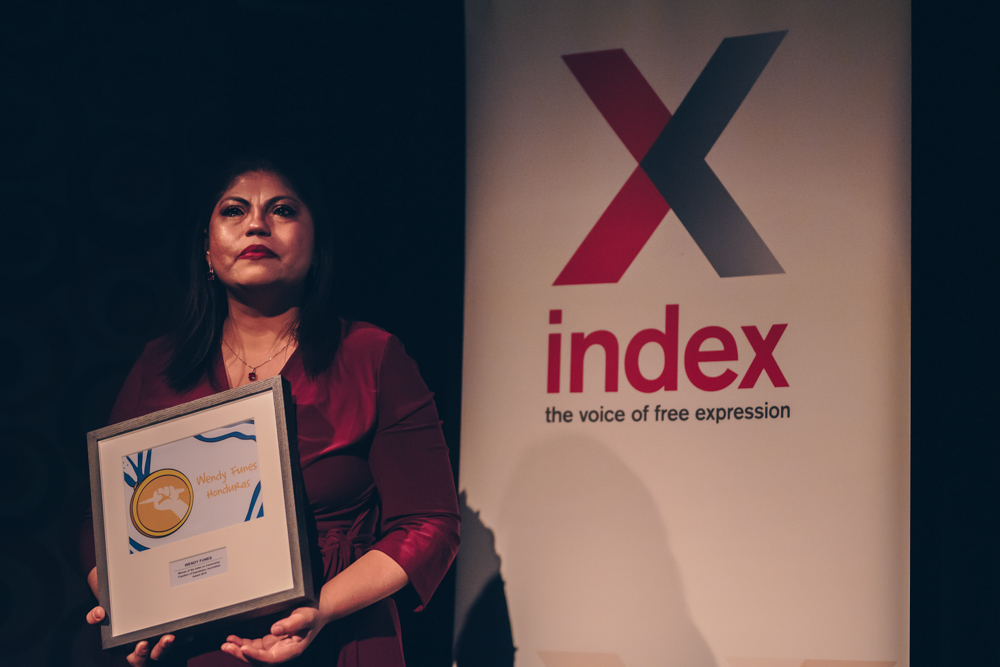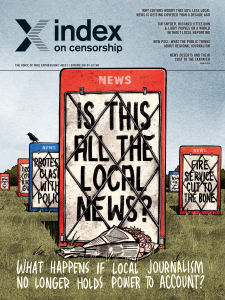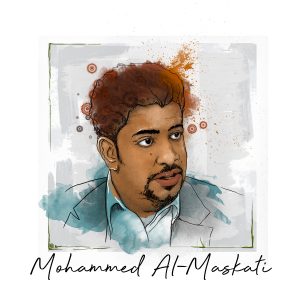11 Apr 2019 | Index in the Press
Monday wasn’t the best day for the government to launch Online Harms, its white paper on internet regulation. As Sajid Javid was proudly proclaiming that Britain would have the toughest internet laws in the world, it emerged that a British woman had been arrested on a trip to Dubai and faced up to two years in prison for describing her ex-husband’s new wife as a ‘horse’ on Facebook. So does the Home Secretary want the UK to have tougher internet laws than the United Arab Emirates? If so, he might find himself at odds with the Foreign Secretary, who has been working behind the scenes to secure the poor woman’s release. Read the full article
1 Apr 2019 | Awards, Awards Update, Fellowship, Fellowship 2018, News and features
[vc_row][vc_column][vc_column_text]

2018 Freedom of Expression Journalism Award-winner and 2018 Journalism Fellow Honduran investigative journalist Wendy Funes at the 2018 Index on Censorship Freedom of Expression Awards (Photo: Elina Kansikas for Index on Censorship)
“Despite my fears and the pain that violence has left in my country, it has been wonderful to see that it has been worthwhile to dream in a world with so much solidarity,” Wendy Funes, winner of the 2018 Index on Censorship Freedom of Expression Awards Fellowship for Journalism, told Index on Censorship.
Freedom of expression has suffered a steep decline in Honduras, a country where 70 journalists have been killed over the last nine years, with Gabriel Hernández’s murder on 17 March marking the first of 2019. Wendy Funes, an investigative reporter who runs her own online news website, Reporteros de Investigacion, is one of the few remaining journalists in the country that continues reporting and investigating issues despite the immense pressure to remain silent.
As a woman journalist in Honduras, a country in which gender-based violence is a serious issue, as is violence against journalists, Funes finds it important to attend events for women in leadership, such as the one she attended in Mexico City with the Center for Women’s Global Leadership.
“It helped me to realise that I am not alone in the continent and to know that there are other places with women who are specialised and do methodical and rigorous work,” said Funes.
Although she has faced a great deal of adversity as a woman journalist, Funes considers herself lucky having been given the opportunity to study and have a career in journalism, when seven out of every ten Hondurans live in poverty, with more than a million children without access to school and a small percentage of people who finish high school.
2019 is proving to be a busy year for Funes as she undertakes a new project, Sembrando el Periodismo de Investigacion en Honduras, with the help of a grant from National Endowment for Democracy. The project consists of four major investigations, two of which Funes and her team are currently working on.
The first is an investigation into the Trans 450, a transmetro that was promised to Hondurans and cost them $9 million, but has not been put into operation yet. The second investigation examines the impunity on aggressions against freedom of expression.
“The NED project is our first significant project and the support and respect they have shown for our work is really important to us,” said Funes.
The biggest project Funes has planned for the future, however, is the building of a Centre for Investigative Journalism that will be the first centre of its kind in Honduras.
“We want the office to become a training space for press and media professionals, advocates, professionals from universities, and academics who wish to learn,” said Funes.
In preparation for building the centre, Funes and her team are working with Factum magazine of El Salvador to train journalists and students. They will hold the first workshop in April of this year and the hope is that they will develop a network of journalists that will then serve as the foundation for the Centre for Investigative Journalism.
“For now, our priority is to strengthen our office and our business model, to nurture alliances and strengthen the network that will one day become the centre we are talking about,” said Funes.
Being an Index fellow has opened up many new opportunities for Funes, but has also renewed her own sense of confidence in herself as a woman and as a journalist.
“Index appeared in my life as a gift of providence and helped me at a very fundamental moment because the award coincided with the year I made the decision found my own newspaper,” said Funes. “They showcased me and my work and many more people followed in encouraging and supporting me.”[/vc_column_text][/vc_column][/vc_row][vc_row][vc_column][vc_basic_grid post_type=”post” max_items=”4″ element_width=”6″ grid_id=”vc_gid:1554114253076-1aebf9f6-f8dd-7″ taxonomies=”10735″][/vc_column][/vc_row]
26 Mar 2019 | Magazine, Magazine Editions, Volume 48.01 Spring 2019
[vc_row][vc_column][vc_custom_heading text=”With contributions from Richard Littlejohn, Libby Purves, Michal Hvorecký, Karoline Kan, Andrew Morton, Jeffrey Wasserstrom, Rituparna Chatterjee and Julie Posetti”][/vc_column][/vc_row][vc_row][vc_column][vc_column_text]

Is this all the local news? The spring 2019 issue of Index on Censorship magazine.
The spring 2019 edition of Index on Censorship looks at local news in the UK and around the world and what happens when local journalism no longer holds power to account.
Our exclusive survey of editors and journalists in the UK shows that 97% are worried that local newspapers don’t have the resources any more to hold power to account. Meanwhile the older population tell us they are worried that the public is less well informed than it used to be. Local news reporting is in trouble all over the world. In the USA Jan Fox looks at the news deserts phenomenon and what it means for a local area to lose its newspaper. Karoline Kan writes from China about how local newspapers, which used to have the freedom to cover crises and hold the government to account, are closing as they come increasingly under Communist Party scrutiny. Veteran English radio journalist Libby Purves tells editor Rachael Jolley that local newspapers in the UK used to give a voice to working-class people and that their demise may have contributed to Brexit. In India Rituparna Chatterjee finds a huge appetite for local news, but discovers, with some notable exceptions, that there is not enough investment to satisfy demand. “Fake news” is on the rise, and journalists are vulnerable to bribery. Meanwhile Mark Frary examines how artificial intelligence is being used to write news stories and asks whether this is helping or hindering journalism. Finally an extract from the dystopian Slovak novel Troll, Michal Hvorecký published in English for the first time imagines an outpouring of state-sponsored hate
[/vc_column_text][/vc_column][/vc_row][vc_row][vc_column][vc_custom_heading text=”Special Report: Is this all the local news?”][/vc_column][/vc_row][vc_row][vc_column][vc_column_text]
The future is robotic by Mark Frary Would journalists have more time to investigate news stories if robots did the easy bits?
Terrorising the truth by Stephen Woodman Journalists on the US border are too intimidated by drug cartels to report what is happening
Switched off by Irene Caselli After years as a political football, Argentinian papers are closing as people turn to the internet for news
News loses by Jan Fox Thousands of US communities have lost their daily papers. What is the cost to their area?
Stripsearch by Martin Rowson On the death of local news
What happens when our local news disappears by Tracey Bagshaw How UK local newspapers are closing and coverage of court proceedings is not happening
Who will do the difficult stories now? by Rachael Jolley British local newspaper editors fear a future where powerful figures are not held to account, plus a poll of public opinion on journalism
“People feel too small to be heard” by Rachael Jolley Columnist Libby Purves tells Index fewer working-class voices are being heard and wonders whether this contributed to Brexit
Fighting for funding by Peter Sands UK newspaper editors talk about the pressures on local newspapers in Britain today
Staying alive by Laura Silvia Battaglia Reporter Sandro Ruotolo reveals how local news reporters in southern Italy are threatened by the Mafia
Dearth of news by Karoline Kan Some local newspapers in China no longer dig into corruption or give a voice to local people as Communist Party scrutiny increases
Remote controller by Dan Nolan What happens when all major media, state and private, is controlled by Hungary’s government and all the front pages start looking the same
Rocky times by Monica O’Shea Local Australian newspapers are merging, closing and losing circulation which leaves scandals unreported
[/vc_column_text][/vc_column][/vc_row][vc_row][vc_column][vc_custom_heading text=”Global View”][vc_column_text]
[/vc_column_text][/vc_column][/vc_row][vc_row][vc_column][vc_custom_heading text=”In Focus”][vc_column_text]
Turning off the searchlights by Alessio Perrone The Italian government attempts to restrict coverage of the plight of refugees crossing the Mediterranean
Standing up for freedom Adam Reichardt A look at Gdańsk’s history of protest and liberalism, as the city fights back after the murder of mayor Paweł Adamowicz
After the purge by Samuel Abrahám and Miriam Sherwood This feature asks two writers about lessons for today from their Slovak families’ experiences 50 years ago
Fakebusters strike back by Raymond Joseph How to spot deep fakes, the manipulated videos that are the newest form of “fake news” to hit the internet
Cover up by Charlotte Bailey Kuwaiti writer Layla AlAmmar discusses why 4,000 books were banned in her home country and the possible fate of her first #MeToo novel
Silence speaks volumes by Neema Komba Tanzanian artists and musicians are facing government censorship in a country where 64 new restrictions have just been introduced
[/vc_column_text][/vc_column][/vc_row][vc_row][vc_column][vc_custom_heading text=”Culture”][vc_column_text]
The year of the troll by Michal Hvorecký This extract from the novel Troll describes a world where the government controls the people by spewing out hate 24 hours a day
Ghost writers by Jeffrey Wasserstrom The author and China expert imagines a fictional futuristic lecture he’s going to give in 2049, the centenary of Orwell’s Nineteen Eighty-Four
Protesting through poetry by Radu Vancu Verses by one of Romania’s most renowned poets draw on his experience of anti-corruption protests in Sibiu
[/vc_column_text][/vc_column][/vc_row][vc_row][vc_column][vc_custom_heading text=”Column”][vc_column_text]
[/vc_column_text][/vc_column][/vc_row][vc_row][vc_column][vc_custom_heading text=”Endnote”][vc_column_text]
Press freedom: EU blind spot? By Sally Gimson Many European countries are violating freedom of the press; why is the EU not taking it more seriously?
[/vc_column_text][/vc_column][/vc_row][vc_row][vc_column width=”1/3″][vc_custom_heading text=”Subscribe”][vc_column_text]In print, online, in your mailbox, on your iPad.
Subscription options from £18 or just £1.49 in the App Store for a digital issue.
Every subscriber helps support Index on Censorship’s projects around the world.
 SUBSCRIBE NOW[/vc_column_text][/vc_column][vc_column width=”1/3″][vc_single_image image=”105481″ img_size=”medium”][/vc_column][vc_column width=”1/3″][vc_custom_heading text=”Listen”][vc_column_text]The spring 2019 magazine podcast, featuring interviews with editor of chinadialogue, Karoline Kan; director of the Society of Editors in the UK Ian Murray and co-founder of the Bishop’s Stortford Independent, Sinead Corr. Index youth board members Arpitha Desai and Melissa Zisingwe also talk about local journalism in India and Zimbabwe
SUBSCRIBE NOW[/vc_column_text][/vc_column][vc_column width=”1/3″][vc_single_image image=”105481″ img_size=”medium”][/vc_column][vc_column width=”1/3″][vc_custom_heading text=”Listen”][vc_column_text]The spring 2019 magazine podcast, featuring interviews with editor of chinadialogue, Karoline Kan; director of the Society of Editors in the UK Ian Murray and co-founder of the Bishop’s Stortford Independent, Sinead Corr. Index youth board members Arpitha Desai and Melissa Zisingwe also talk about local journalism in India and Zimbabwe
LISTEN HERE[/vc_column_text][/vc_column][/vc_row]
19 Mar 2019 | Awards, News and features
[vc_row][vc_column][vc_video link=”https://youtu.be/1VVGMgSHM6U”][vc_column_text] Mohammed al-Maskati is a Bahraini activist and digital security consultant who provides digital security training to activists in the Middle East and in North Africa.
Mohammed al-Maskati is a Bahraini activist and digital security consultant who provides digital security training to activists in the Middle East and in North Africa.
Working as Frontline Defenders’ Digital Protection Consultant for the MENA Region, Mohammed teaches activists – ranging from vulnerable minorities to renowned campaigners taking on whole governments – to get the truth out despite governments’ attempt to shut them down. He educates them on the use of VPNs, and how to avoid falling into phishing or malware traps, create safe passwords and keep their accounts anonymous.
The MENA region is one of the most oppressive areas of the world for human rights defenders, but it is too often ignored by app and software developers, who do not provide products or instructions manual in Arabic.
Mohammed Al-Maskati opens the door to using digital security apps, and as a direct result of his training, a growing number of activists in the Middle East have reported being able to avoid government surveillance and reprisals.
Regional governments have also taken notice of Mohammed’s activities. In May 2014, during a visit to Oman, he was kidnapped from a taxi and disappeared for three days, during which he was asked the names of the people he was helping. He has been banned from travelling to at least five countries, making it more difficult to reach activists in the region.
A good example is Mohammed’s work in Iraq. Demonstrations erupted in September, and clashes broke out between protesters and Iraqi forces. The independent media websites reporting on the unrest were soon taken down by the government.
Mohammed travelled to Iraq and helped the activists to circumvent censorship, and the websites were able to keep going.
He had a similar impact in Egypt ahead of the March 2018 national elections, when the government was censoring not only websites but also several VPN services. Mohammed was able to arrange for a group of organisations to offer their VPN for free to Egyptian human rights defenders and journalists.
Mohammed has also been active to circumvent his travel ban. He has written Arabic-language training manuals on digital security, which he has released online, and set up a digital security email newsletter. He is also the founder of and part of the rapid response team, which is available 24 hours a day 7 days a week to help tackle digital attacks as they happen in real time.[/vc_column_text][vc_separator][vc_row_inner][vc_column_inner width=”1/2″][vc_single_image image=”104691″ img_size=”full” onclick=”custom_link” link=”https://www.indexoncensorship.org/2019/01/awards-2019/”][/vc_column_inner][vc_column_inner width=”1/2″][vc_column_text]
Index on Censorship’s Freedom of Expression Awards exist to celebrate individuals or groups who have had a significant impact fighting censorship anywhere in the world.[/vc_column_text][/vc_column_inner][/vc_row_inner][vc_separator][/vc_column][/vc_row][vc_row][vc_column][vc_basic_grid post_type=”post” max_items=”4″ element_width=”6″ grid_id=”vc_gid:1552650108302-4a47418b-5e3e-10″ taxonomies=”26925″][/vc_column][/vc_row]



 Mohammed al-Maskati is a Bahraini activist and digital security consultant who provides digital security training to activists in the Middle East and in North Africa.
Mohammed al-Maskati is a Bahraini activist and digital security consultant who provides digital security training to activists in the Middle East and in North Africa.